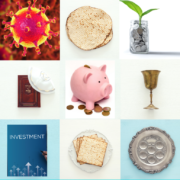HANUKKAH: WHAT TO DO WITH YOUR GELT?
With the holiday of Hanukkah upon us, ‘gelt’ or money plays a central role. As both children and some parents (especially those with generous in-laws!) receive cash, the question is what to do with the new-found bonanza. Should you use it to buy the latest gadget from Apple that you “just can’t do without”? Or, is there a better approach that will help your financial situation in the long run? Here are some tips that will help you become a better investor.
Allocation
Perhaps the single most important aspect in growing wealth is to allocate your portfolio correctly. This means having the correct mix of stocks and bonds. Your stock portfolio should have large companies and small, representing growth and value. Your bond portfolio should have non-U.S. dollar bonds as well as a small percentage of high yield and emerging market bonds. This will help create a portfolio with lower volatility and the smoother ride can even potentially help increase returns as the portfolio can compound at a greater rate if there are no huge drops.
Think International
With the U.S. share in foreign equity markets constantly decreasing and with much of the world’s growth coming from outside the U.S., international exposure is a must. While most allocation models call for 20-30% of a portfolio to be invested outside the U.S., I think that number needs to be closer to 50%. It’s important to note that I am not referring to investing 50% of a portfolio in Europe; rather, one should have exposure to Asian economies, as well as those in Central and South America.
Rebalance
Buy low and sell high. That is the holy grail of investing. All too often I see portfolios that haven’t been touched in years. What was an appropriate investment allocation for a 30 year old is going to be different for someone who is 50. Additionally, due to market movements, your allocation may be way too aggressive or conservative than you originally wanted. A yearly rebalance solves this issue. You end up selling assets that have increased in value and buy more of those that are trading at lower levels. You get your stock/bond allocation back to the level that is right for you. Many studies have shown that regular rebalancing and strategic asset allocation is key to achieving solid investment returns, as opposed to trying to generate huge profits from excessive stock trading.
Forget About Beating the Market
There is a lot of noise in the financial media about the need for investors to ‘beat
the market’, pushing investors to strive to somehow get better returns than could be had by just tracking the market. This sounds all well and good if we were living in a vacuum and if the entire point of investing was to make as much money as possible. Unfortunately for many of us, there is a point to investing. That is to make enough money to help achieve our goals of marrying off children or paying for our retirement, just to name a few. Most investors should have portfolios that have nothing to do with beating the market, focusing instead on meeting their goals and needs.
Save
If the recent financial crisis has taught us anything it’s that we have to value money the way our grandparents did. This means that we need to save. If you receive a dollar, save 20 cents. This should be your first action. Then figure out what you need to buy. The easiest way to build wealth is buy savings. Investing is nice and highly recommended, but without savings, it’s going to be an uphill battle to be able to pay for the goals that you set forward.
Part of the Hanukkah story is about the Greeks wanting to secularize the Jewish people. Forget about religious observance and embrace Hellenism. Today we face our own challenges of Hellenism. If we are speaking in financial terms, this means the fight against overblown consumerism and the need for us to have more and more material goods. Let us enjoy a re-dedication and go back to the basic principles of investing and saving money.
Happy Hanukkah!
The information contained in this article reflects the opinion of the author and not necessarily the opinion of Portfolio Resources Group, Inc., or its affiliates.
Aaron Katsman is author of the book Retirement GPS: How to Navigate Your Way to A Secure Financial Future with Global Investing (McGraw-Hill), and is a licensed financial professional both in the United States and Israel, and helps people who open investment accounts in the United States. Securities are offered through Portfolio Resources Group, Inc. (www.prginc.net). Member FINRA, SIPC, MSRB, SIFMA. For more information, visit www.aaronkatsman.com or email aaron@lighthousecapital.co.il






